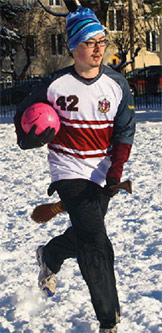Harry Potter casting a spell on students
 CREDIT: FACEBOOK.COM/UOTTAWAQUIDDITCH
CREDIT: FACEBOOK.COM/UOTTAWAQUIDDITCHA student participant runs with the quaffle during a Quidditch match on the University of Ottawa campus.
Harry Potter has apparated onto North American campuses in more ways than one. The popular series by J.K. Rowling attained worldwide popularity in 1997 upon the release of the first novel Harry Potter and the Philosopher's Stone. The series has since been a fixture of our generation's formative years. For some fans, Harry Potter was more than a story, and many went to great lengths to bring it from fiction into real life.
“Brooms up!” is the starting call of every Quidditch match — real life Quidditch, that is. Of all places the real-life version of the famous broomstick-riding game Quidditch would be created, Vermont is probably the last place you'd think of. Back in 2005, Middlebury College student Alex Benepe decided to take the fictional game of Quidditch from the Harry Potter series and turn it into a real game, complete with broomsticks. After garnering a ton of interest across North America, Benepe went on to create the International Quidditch Association. The IQA has nearly 1,000 teams worldwide, the majority of which are located in the United States, which has become the hub of the Quidditch world.
Ironically, the impromptu World Cup that was held in Britain during the 2012 London Olympics ended with Britain finishing last, in the tournament of six countries, and Quidditch has yet to garner as great an interest as it has in the United States, despite Britain being the birthplace of Quidditch.
Jamie LaFrance was the director of the first-ever Canada Day Fantasy Tournament in Ottawa in July, a Quidditch tournament that saw participants from all over the country. This University of Ottawa student participated World Cup tournament in England, where Canada finished fourth out of six countries. He started his Quidditch experience having never read the Harry Potter series.
“I first tried it two years ago and it was pretty fun, but I had never read the books and I had nothing better to do, so I thought I would try it,” said LaFrance.
This isn't unusual for the sport of Quidditch, either. It is very popular with people who never read the Harry Potter series and who are attracted to the competitive nature of the game.
What sets Quidditch apart from other sports, said LaFrance, is that it is inclusive; people who were never athletic to begin with are joining the game and playing against former athletes who may not have been good enough to play university- or college-level sports.
For Clare Hutchison, the assistant director of the Canada Day fantasy tournament, the inclusive nature of Quidditch is very important.
“It's really inclusive to people who don't identify as a particular gender, and they aren't forced to identify, as (they may be) in some sports,” explained Hutchinson.
The reason for this is because Quidditich is the only co-ed full contact sport offered on campuses. Hutchinson described as being a combination of “rugby, flag football and dodgeball.” People often underestimate how physically demanding Quidditch is and how serious it is taken by those who play. Samy Mousa, the head of the Referee Development Team for the Canada Day Fantasy Tournament, discovered Quidditch after suffering a shoulder injury that rendered him unable to play football.
“It was perfect for me because in Quidditch one of your hands must always be on the broom, so I only needed one good arm to catch. My injury doesn't affect how I play the game.”
The way Quidditch has been adapted to the real world is similar to the game in the books... minus the flying. In order to score, you must throw the quaffle (a partially deflated volleyball) through one of three hoops — each is worth 10 points. During the attempts to score, opposing players can tackle you, and once you're on the ground, you must give up the quaffle. Players must always be straddling their brooms: if you get hit by a “bludger” (a dodgeball), you must get off your broom, run back to your team's hoops, touch it and remount your broom. The golden snitch — the speedy ball Quidditch players catch to score 150 points and end the game — portion of the game is considered a silly part of the game. In real-life Quidditch, the snitch is a person running around the pitch with a tennis ball in a sock hanging off the back of their shorts. The game ends when the tennis ball is taken, however it is quite difficult and many ex-track and field athletes end up with this position. The game goes on until the snitch is caught.
This fast-growing sport has an international following. Western University started a team, only to have it fall apart a short time after. With the growing interest in Harry Potter on university and college campuses alike, it's bound to make a return, with plans in the works to start a new team.













